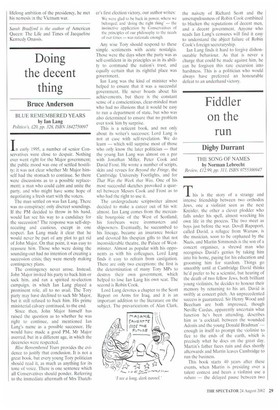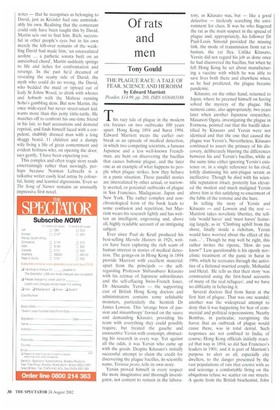Fiddler on the run
Digby Durrant
THE SONG OF NAMES by Norman Lebrecht
Review, £12.99, pp. 311, ISBN 0755300947
This is the story of a strange and intense friendship between two orthodox Jews, one a violinist seen as the next Kreisler, the other a clever plodder who falls under his spell, almost wrecking his own life in the process. The two meet as boys just before the war. Dovdl Rapoport, called David, a refugee from Warsaw, is the musician, soon to be orphaned by the Nazis, and Martin Simmonds is the son of a concert organiser, a shrewd man who recognises David's genius by taking him into his home, paying for his education and grooming him for stardom. Things go smoothly until at Cambridge David thinks he'd prefer to be a scientist, but hearing of the death of two fellow Jews, both brilliant young violinists, he decides to honour their memory by returning to his art. David is swiftly at concert pitch. An unprecedented success is guaranteed. Sir Henry Wood and Beecham are both impressed, though Neville Cardus, apparently uncertain what function he's been attending, describes him as 'a cocktail, between the wounded Adonis and the young Donald Bradman' — enough in itself to prompt the violinist to flee to the ends of the earth, which is precisely what he does on the great day. Martin's father faces ruin and dies shortly afterwards and Martin leaves Cambridge to run the business.
This book starts 40 years after these events, when Martin is presiding over a talent contest and hears a violinist use a ruhato — the delayed pause between two notes — that he recognises as belonging to David, just as Kreisler had one unmistakably his own. Realising that the contestant could only have been taught this by David, Martin sets out to find him. Rich, successful in other people's eyes but in his own merely the left-over remains of the weakling David had made him, 'an emasculated acolyte ... a pathetic sonata built on an unresolved chord', Martin suddenly springs to life and itches for confrontation and revenge. In the past he'd dreamed of revealing the seamy side of David, the myth who could do no wrong, the David, who bedded the maid or tiptoed out of leafy St Johns Wood, to drink with whores and hobnob with the Maltese running Soho's gambling dens. But now Martin, the once wide-eyed but never street-smart kid, wants more than this petty tittle-tattle. He marches off to confront his one-time friend in his lair, to hurl accusations and demand reprisal, and finds himself faced with a corpulent, shabbily dressed man with a long shaggy beard, 11 children and a dumpy wife living a life of great contentment and evident holiness who, on opening the door, says gently, 'I have been expecting you.'
This complex and often tragic story reads entertainingly rather than movingly, perhaps because Norman Lebrecht is a talkative writer easily lead astray by colourful, funny and learned digressions. Even so The Song of Names remains an unusually 'mpressive first novel.































































 Previous page
Previous page